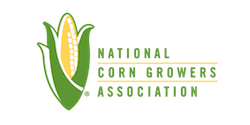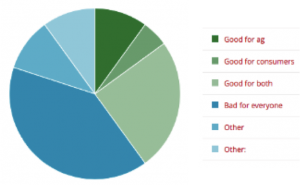 The National Corn Growers Association‘s Corn Congress elected five new farmers to serve on the Corn Board this week. The new board members will begin their terms on October 1; the start of the NCGA’s fiscal year. New members are: Chris Edgington of Iowa, Don Glenn of Alabama, Tom Haag of Minnesota and John Linder of Ohio. A current board member, Kevin Ross of Iowa, was re-elected.
The National Corn Growers Association‘s Corn Congress elected five new farmers to serve on the Corn Board this week. The new board members will begin their terms on October 1; the start of the NCGA’s fiscal year. New members are: Chris Edgington of Iowa, Don Glenn of Alabama, Tom Haag of Minnesota and John Linder of Ohio. A current board member, Kevin Ross of Iowa, was re-elected.
“Again this year, we had an impressive slate of candidates for the Corn Board, growers who already have an extensive history of service to American agriculture,” NCGA Chairman Martin Barbre, who chairs the nominating committee, said. “It inspires me to see such an interest on the part of these growers, particularly at this time when our industry faces so many challenges. I am certain they will be a valuable addition to the board and look forward to see what they do for corn farmers I the years to come.”
Chris Edgington has been serving on NCGA’s Trade Policy and Biotechnology Action, as well as acting as chair for the Iowa Corn Promotion Board.
Don Glenn has previously chaired NCGA’s Production and Stewardship Action Team and Mycotoxin Task Force, and has also served on the Ethanol Committee. He has also been a president of the Alabama Soybean and Corn Association.
Tom Haag is a graduate of the Advanced Leadership Program and a member of the NCGA Research and Business Development Action Team. Previously Haag has chaired the Grower Services Action Team and been a past president of the Minnesota Corn Growers Association.
John Linder has worked as chair of the Ohio Corn Marketing Program and been a member of the Ag Credit Co-op Board of Directors. He now serves as chair of the NCGA Trade Policy and Biotechnology Action Team.
Current Corn Board member, Kevin Ross, is the board liaison to the Trade Policy and Biotechnology Action Team and the 2017 Commodity Classic Joint Venture Committee co-chair. He has previously chaired the Finance Committee and is a past president of the Iowa Corn Growers Association.
The NCGA Corn Board is responsible for directing policy and day-to-day operations. They supervise NCGA activities and affairs and implement NCGA policy. Members also act as spokespeople for the organization.










